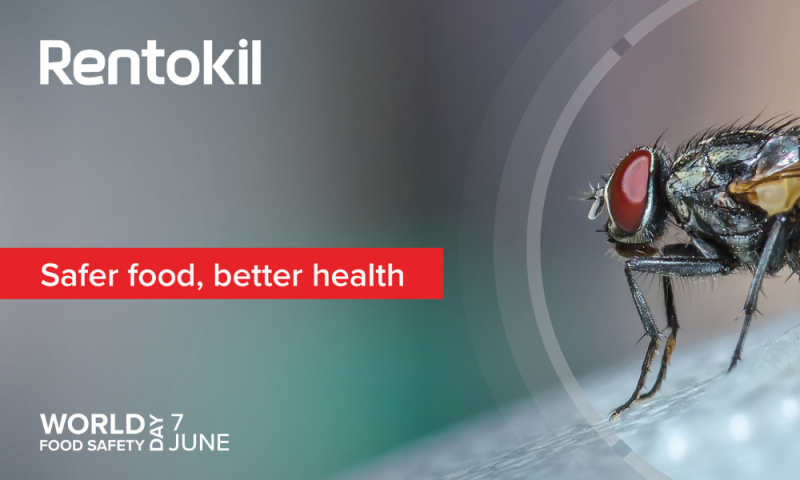Pests and food safety in Malaysia
Today falls the fourth-annual World Food Safety Day, created by the partnership between the World Health Organisation (WHO) and the Food and Agriculture Association of the United Nations (FAO) in 2018 to raise awareness of food safety and inspire action to prevent, detect and manage foodborne safety risks. The theme for this year is "Safer Food, Better Health," which focuses on fulfilling needs by recognising the links between people's health, plants, animals, ecosystems, and the economy. In this article, we’ll be understanding better on a few questions commonly asked by people who aren’t familiar with how pests are a risk to food safety.
How does food safety affect me?
Food safety revolves greatly in everyone's lives due to the rapid growth of urbanisation and it is a compulsory practice that is done globally in the entire food supply chain process. However, there are some businesses that may fall out in following food safety standard protocols in ensuring the food produced is uncontaminated leading to a risk of contracting foodborne illnesses. For instance, not washing fruits and vegetables, cross-contamination from using the fruits and raw meat together, not storing food in optimum temperature places, and many more. Foodborne illnesses such as Salmonella and Escherichia coli are common bacteria that harm people and are usually spread by cockroaches and flies that carry them when they come in contact with food or water.
According to the United Nations, illnesses caused by unsafe foods affect one in ten people annually which is around 600 million cases of foodborne illnesses and an estimated number of 420,000 deaths globally from eating contaminated food. Imagine consuming food bought from a supermarket and falling seriously ill the next day with symptoms of nausea, vomiting, stomach cramps, etc. Food safety risks will affect us in many ways, as long as there is food produced by unregulated food manufacturers and restaurants.
How can pest control help in food safety for businesses?
Food safety is influenced by how it is produced, stored, transported, handled, and consumed. There are many solutions to food safety considerations and one of the solutions includes engaging in consistent professional pest control because pests are drawn to 3 basic needs - food, water, and shelter. Hence, when running a food business, pests will be drawn to the premise since it has all the basic needs required to thrive and if the business premise has no defence lines against pests properly enforced. There are many pest entry points that are often neglected and overlooked by food handlers in food storage areas. Without a professional pest control partner, this will result in possible food contamination. This will be a food safety problem because cockroaches carry harmful pathogens, one of the main causes of foodborne illness from contaminated food. By preventing the deterioration and contamination of foods with pathogens, carcinogens, and allergies caused by pests, pest management plays a vital role in food safety across the food supply chain.
Food safety standard practices in Malaysia
Food safety gives an assurance that food is prepared hygienically and will not cause any illness to the consumer. There are many diseases, which are transmitted through the ingestion of contaminated foods. There are various food safety standards in Malaysia such as International Food Standard (IFS), Good Manufacturing Practice (GMP), HACCP, AIB, and more to help food industries to establish an effective regulatory food control system including having consistent pest control services to produce safe food.
Consequences of not complying with food safety standards?
The Food Safety & Quality Division from the Ministry of Health takes food safety seriously with the initiative to conduct food premise inspections. When a business is caught not complying with the standards and regulations. Under food safety standards practised in Malaysia: Food Act 1983 Food Regulation 1985 Food Hygiene Regulation 2009. The business may bare heavy losses from:
● Revenue lost from court charges
● Tarnished reputation
● Temporary shutdown of operations or;
● Permanent shutdown for serious cases
A similar case to this would be a food manufacturer in Penang which was ordered to shut down due to rodent droppings and cockroaches infestation. Read more at - Click here.
About Rentokil on Food Safety
Rentokil Malaysia takes pride in helping out businesses in need of help to strengthen food safety by providing stringent planning and effective pest control solutions.
Our mission is always protecting people and enhancing lives by reducing foodborne illness in Malaysia through pest control for better food safety that will serve the public. It only takes engaging with a professional pest control provider to prevent the risks of jeopardising food safety and prevent outbreaks. At Rentokil, we understand the need of following strict protocols and standards to ensure safe food for consumers to enjoy. This is why we recommend the food industry have integrated pest management (IPM) from our pest control solutions as a pre-requisite program for all food industries. Thus, we firmly believe that food safety measures are the answer to achieving our goal.
If you are interested in finding out more about what we have to offer to your business on food safety, don’t hesitate to contact us at 1 300 882 911. We provide a wide range of solutions to keep your business protected all year long.
This content is provided by Rentokil Initial (M) Sdn Bhd.
Interested in having your announcements on Malaysiakini? Contact the announcements team at [email protected] or whatsapp on +60 17-323 0707 for urgent matters.
RM12.50 / month
- Unlimited access to award-winning journalism
- Comment and share your opinions on all our articles
- Gift interesting stories to your friends
- Tax deductable
